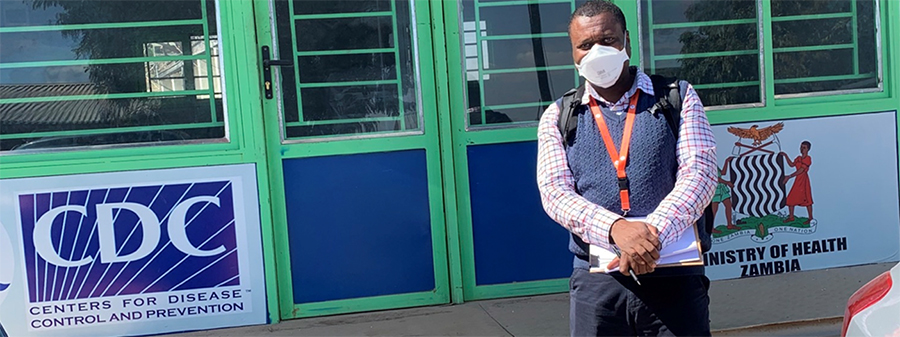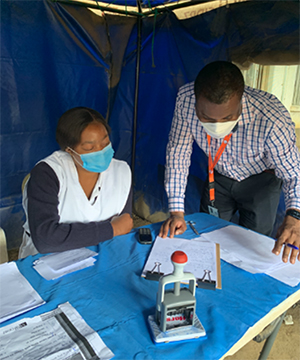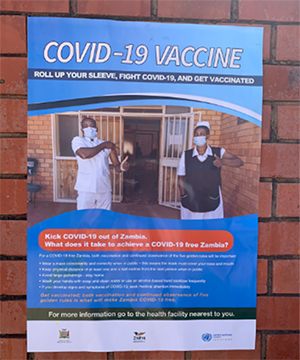Taking on COVID-19 in Zambia
Summary
- CDC is working closely with the Zambia Ministry of Health (MOH) to contain the spread of COVID-19.
- April 2021 – Zambia received its first 228,000 doses of COVID-19 vaccine.
- June 2021 – Zambia MOH announced that the country entered its third wave of COVID-19. Health officials face vaccine hesitancy.
- July 2021 – 228,000 more vaccine doses delivered to Zambia.
- CDC and Zambian public health officials are focused on encouraging people to get vaccinated.

U.S. CDC’s Kerton Victory, PhD., conducted a COVID-19 vaccine readiness site assessment at a Hospital in Lukasa, Zambia with colleagues from the Ministry of Health (MOH).
Photo by Champo Chola/Zambia MOH
Kerton Victory, PhD, has devoted his career to public health. He’s a senior epidemiologist at CDC, which means he’s a disease detective and a member of CDC’s Global Rapid Response Team. He supports local health officials during some of the most difficult public health emergencies, such as Ebola and now, COVID-19.
In April 2021, Victory joined the CDC team in the southern African nation of Zambia for a 90-day assignment. CDC Zambia is working closely with the Ministry of Health (MOH) to support the country’s efforts to contain the spread of the virus.
Fifteen months after Zambia reported its first case of COVID-19, the number of cases went up again. In June 2021, the MOH announced that the country entered its third wave of COVID-19. To prevent COVID-19 from spreading further, health officials initiated a vaccination campaign. It encourages everyone to continue following the MOH “Five Golden Rules:”
- Mask up in public
- Maintain physical distance
- Wash hands frequently or use hand sanitizer
- Avoid crowded places and stay home
- Seek medical treatment early if you have symptoms

To ensure safe vaccinations, U.S. CDC senior epidemiologist Kerton Victory and a nurse at a vaccination site in Lusaka, Zambia, go over a COVID-19 vaccination readiness checklist on May 4, 2021.
Photo by Kerton Victory/CDC

This poster explains that to “Kick COVID-19 out of Zambia” vaccinations and continued observance of the MOH’s Five Golden Rules are necessary.
Photo by Kerton Victory/CDC
Getting Vaccines and Getting People Vaccinated
Zambia received its first 228,000 doses of COVID-19 vaccine on April 12, 2021. Two days later, Health Minister Dr. Jonas Chanda officially launched the COVID-19 vaccination program. The goal is to get 8.4 million people aged 18 and older vaccinated.
COVID-19 vaccination is voluntary in Zambia, and as of July 5, 2021, only 142,000 people got their first dose of the vaccine and 23,000 people are fully vaccinated. Victory says one of the major challenges health officials are facing is vaccine hesitancy, which is not unique to Zambia.
Zambia’s first doses were produced by AstraZeneca in India. The World Health Organization (WHO) listed AstraZeneca’s COVID-19 vaccine for emergency use in February 2021, making it available for distribution to low- and middle-income countries through the global COVID-19 vaccine distribution program called COVAX.
Reports of Rare Side Effects Raise Doubts
Hundreds of millions of doses of AstraZeneca COVID-19 vaccine have been given to people in 117 countries. But in March, reports of some people developing blood clots after getting their first dose of this vaccine began to emerge. WHO says this is a “very rare syndrome.” Data from the United Kingdom showed that blood clots occurred at a rate of four cases in one million adults who received their first dose of the vaccine.
“News about the AstraZeneca vaccine causing blood clots in rare cases in other countries is getting a lot of attention on social media, particularly on WhatsApp,” says Victory. He says the fear of blood clots along with an overall mistrust of vaccines in parts of the population is adding to people being less eager to get the vaccine.
Recent studies also suggest that if you get sick with COVID-19, the risk of getting blood clots is ten times higher than the risk after getting the vaccine.
WHO is encouraging all countries to be aware of and investigate all possible rare side effects that might occur after vaccination.
“We are currently working with the MOH and local health officials to develop a national tracking system so that we can see if people have any adverse reactions to the COVID-19 vaccine and how we can go about documenting that,” Victory says.
Reinforcing Benefits of Getting Vaccinated
Another part of his job is to encourage people to get the vaccine by explaining how COVID-19 vaccines can prevent infection, serious illness, and death.
“CDC Zambia and I are working with the Ministry of Health to create messages and communication strategies to explain the benefits of vaccines,” Victory says. Zambia wants to avoid what happened in the neighboring Democratic Republic of the Congo, which returned more than 1 million doses of COVID-19 vaccine before it expired “because very few people wanted to get vaccinated,” he says.
One strategy is to use social media to convey and reinforce prevention messages. Showing people getting vaccinated could help encourage others to get vaccinated, too.
“We are working with religious leaders and people who are famous, like movie stars and local celebrities, to get the message out about the importance of getting the vaccine,” Victory says.
CDC Zambia and local health officials are also working on setting up focus groups in different communities to learn more about how to increase COVID-19 vaccine demand.
Another strategy is to have more vaccines on hand, which will make it easier to ramp up the vaccination campaign.
On June 1, 2021, health officials announced that 5 vaccines are now approved in Zambia. They are AstraZeneca’s COVISHIELD, which is produced in India, AstraZeneca’s COVID-19 vaccine produced in South Korea, Sinopharm, Janssen (Johnson & Johnson), and the Pfizer-BioNtech vaccine.
COVAX delivered 228,000 more doses of vaccine to Zambia on July 5, 2021.
Victory, CDC Zambia, and Zambian public health officials are using as many tools as possible to encourage people to get the vaccine. “We do not want to be in a situation where we have more vaccines than people who are willing to be vaccinated,” he says.